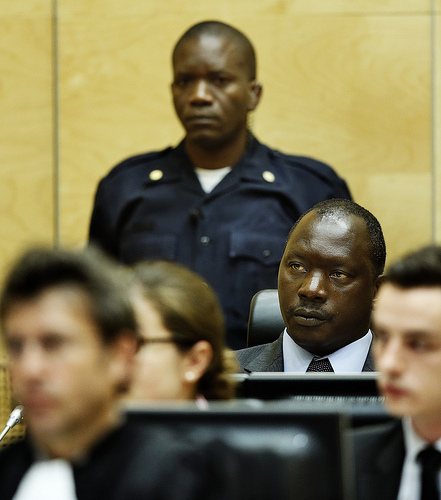
The International Criminal Court handed down a sentence today in the first trial before the tribunal, giving Congolese warlord Thomas Lubanga 14 years behind bars in The Hague. Lubanga will serve eight years, given that the judges took into account that he has been in the custody of the court and Congolese authorities for six. The judges also said that they factored in Lubanga’s cooperation with the court into the decision to have him serve just the balance of the 14-year sentence.
Advocates of the ICC have commended the court’s completion of its first trial and praised its establishment of a precedent criminalizing the exploitation of children by forcing them to serve as soldiers. The Enough Project’s Research Director Mark Quarterman responded to today’s sentencing saying it is a “positive step in establishing the court’s role in ending impunity for the world’s gravest crimes.” He said:
In the 10 years since its inception, the court has developed into a strong mechanism for accountability for war crimes and crimes against humanity. Lubanga’s sentencing is yet another marker of the court’s progress in consolidating international justice as a global norm.
But the decision wasn’t without controversy, even among the judges themselves. Judge Elizabeth Odio Benito wrote a dissenting opinion criticizing the majority decision for disregarding the severity of Lubanga’s crimes perpetrated against victims, and children in particular. The final 12 pages of the judges’ 52-page decision is an appendix by Odio Benito that details her opinion that the sentence does not take into consideration the damage to the victims and their families “particularly as a result of the harsh punishments and sexual violence suffered by the victims of these crimes.” While she took issue with how the sentence was calculated, she concludes that the appropriate sentence would have been 15 years, just one more year than the majority of judges handed down.
The relatively short sentence—the prosecution asked for 30 years, effectively a life sentence—also poses questions about the situation on the ground after Lubanga’s release. “We had hoped he would stay in prison for life in order to ease the minds of the victims," said Emmanuel Folo, a human rights lawyer in Ituri, to Reuters.
Still, the ICC’s decision and conclusion of its first case is a laudable achievement that comes at a particularly tenuous moment in the eastern Congo conflict, one that highlights in grave terms the impact of impunity on future stability. Seen by Congolese authorities as the linchpin to security in Africa’s Great Lakes region, warlord Bosco Ntaganda was left in power, promoted to the position of general in the Congolese army, despite an ICC warrant for his arrest. Today he’s a fugitive, accused of fomenting the latest rebellion to rock the eastern region, while he himself is protected by high-placed allies. The Ntaganda case provides a powerful example of the consequences of allowing wanted war criminals to remain on the battlefield.
Reacting to the Lubanga sentence today, Enough Associate Director of Research Aaron Hall noted the impact of the decision for those still committing crimes in eastern Congo:
Thomas Lubanga’s sentencing is a positive development in achieving justice for his Congolese victims. It should also encourage further arrests, trials, and verdicts for those Congolese currently under indictment by the ICC, including General Bosco Ntaganda, as well as serve as a deterrent to those individuals who continue to perpetuate conflict, human rights abuses, and war crimes in Congo and the region. Lubanga’s sentencing sets a precedent for the orchestrators of mass atrocities in Congo – perpetrators will be called into account.
Photo: Thomas Lubanga receives 14-year sentence the ICC in The Hague (ICC Flickr)

